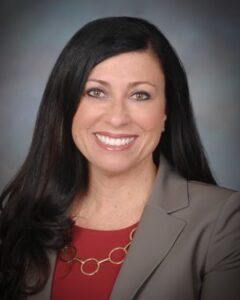 Marlo Hartsuyker, one of CCAP’s newest board members, has served as Director of Charter School Support and Oversight for the Ventura County Office of Education for over seven years. The events that led Hartsuyker on the path to this position began before she even knew what a charter school was.
Marlo Hartsuyker, one of CCAP’s newest board members, has served as Director of Charter School Support and Oversight for the Ventura County Office of Education for over seven years. The events that led Hartsuyker on the path to this position began before she even knew what a charter school was.
It was 2008, and the Conejo Valley Unified School District in Ventura County had voted to close three schools due to declining enrollment districtwide. One of those was Meadows Elementary, the neighborhood school her children attended. The fact that Meadows was just down the street from where they lived was not happenstance: it was the reason she and her husband had moved to that neighborhood.
“It was a very intentional choice of a school because it had a big arts focus, and I’m a strong believer that elementary school students learn best through art, projects, and experiences that make learning more meaningful and keep the spark of curiosity alive,” explains Hartsuyker.
Families were understandably upset about the closure and unsuccessfully lobbied the district to convert Meadows into an arts magnet school. That’s when a fellow parent suggested something that changed the trajectory of Harksuyker’s professional life. “She mentioned this concept of a charter school,” Hartsuyker recalls. Then a practicing attorney, Hartsuyker knew little about it, but she researched everything she could find about charter schools. She thought, “This is amazing. We have to do this.” Many other parents and supporters of Meadows Elementary agreed.
The Conejo Valley Unified School District denied the charter petition, so the parents appealed to the Ventura County Office of Education, which gave it a thumbs up. In August of 2009, Meadows Arts and Technology Elementary School, known as MATES, opened in time for the fall semester, with just under 400 students in kindergarten through fifth grade.
Hartsuyker served as the school board president for several years, driven by a strong belief that parents should have many educational options available in order to find a learning environment that is the best fit for their children, just as she had for her three children. This belief kept her steady and focused throughout the turbulent process. “If students aren’t in the right learning environment from a young age, we may lose them,” she says.
Today, Hartsuyker’ s work at the Ventura County Office of Education centers on fostering environments where children can flourish. Her office authorizes five charter schools and provides some supports to seven others chartered by local school districts. She often speaks with parents who are anxious about their children’s education, helping them explore alternatives that may offer a better fit. “Parents call me all the time,” she says. “They’re struggling because their child hasn’t been thriving in their current setting. By the end of our conversations, many of them feel a sense of relief and hope.”
Building a cohesive, cooperative, and collaborative learning community
The charter school office had a series of short-term transitions in her director position before Hartsuyker arrived, a plight she understands. “No one dreams of becoming a charter school authorizer,” she jokes, acknowledging that it is often a stepping stone role. But she saw the job as a mission, requiring a long-term commitment.
“Behind every excellent charter school is a supportive authorizing partner,” she explains. In order to achieve that, she adds, the charter office “really needed consistency and someone invested in building a strong charter community, including district partners.”
Her experience at MATES showed her that realizing the potential of charter schools as laboratories of innovation can be overwhelming and isolating. All charter schools are lean operations, but smaller schools have unique capacity challenges. Additionally, charter schools board members often lack expertise in school administration and are unfamiliar with charter school regulations.
Hartsuyker spends a great deal of time training charter school boards on their oversight responsibilities. She also holds monthly meetings with charter school directors, alternating between virtual and in-person meetings, and is heartened by how they have created a collaborative community that goes beyond mutual support to attending conferences as a group and even getting together for dinner.
She credits CCAP with developing resources, especially the Authorizer Toolkits, that explain charter law, discuss best practices, and provide step-by-step guidance on everything from charter petitions and renewal applications, to annual reports and finance. One of her goals as a CCAP board member is make sure that every authorizer in the state knows about these resources and understands how to use them to meet their unique needs.
“You can’t just provide a one-size-fits-all resource. We’ve finally gotten to a point where we have a set of really great resources,” she explains, adding that now the task is helping individual authorizers customize those resources to find the “sweet spot” that works for its circumstances.
